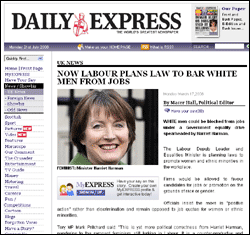Why don’t newspapers sell even less?
 One of the most unanswered questions concerning the British media is why, when survey after survey suggests that journalists, especially of the tabloid ilk, are trusted only slightly more than estate agents, the papers that lie the most to their readers continue to be most successful.
One of the most unanswered questions concerning the British media is why, when survey after survey suggests that journalists, especially of the tabloid ilk, are trusted only slightly more than estate agents, the papers that lie the most to their readers continue to be most successful.
Last month Edelman found that just 19% trust newspapers in this country, while the latest survey, this time for the Media Standards Trust, found that national newspapers were the least trusted of six institutions and organisation. The police, supermarkets, the BBC, hospitals and banks were all more highly trusted, although they did come second, behind the banks, when asked which should be more strictly regulated.
Why then, when so many don’t apparently trust a word of what they’re reading, do they continue for the most part, to buy the likes of the Mail and the Sun?
Is it because they completely ignore most of the news coverage and especially the political reporting, and only focus on the sport and the features, is it macohism, or is that they don’t really care about whether the newspaper they read tells the truth or not?
Some of it might well be down to most newspapers’ complete refusal to be self-critical or so much as suggest that they might get it wrong, except when they’re forced to: after all, both Paul Dacre and Rebekah Wade recently gave defiant speeches in which they directly attacked those critical or cynical of where the newspaper industry is going, while Dacre unleashed an assault directly on Nick Davies’ Flat Earth News, even if not naming it, one of the most critical books in years on the press, with the added sting that it was written by an industry insider, even if from the Guardian, probably the most critical and cynical newspaper on the wider press.
Fundamentally, the main issue is not trust in the press, but accountability.
The same press which widely has taken to assailing the BBC for every slight misdemeanour is far less accountable than the publicly-funded broadcaster, yet this never enters into the discussion when the BBC so openly self-flagellates. As today’s report by the Media Standard Trust points out, the Press Complaints Commission is more or less a direct cabal of the press itself, something which on almost any other industry regulator would be completely unacceptable.
Its powers when it comes to imposing sanctions on those that breach its code are little more than a joke: often corrections and apologies are featured in derisory positions in the paper, far back from where the original ran.
For every complaint which goes to adjudication, hundreds of others are either completely rejected or “resolved”, which often means that nothing more than a note on the PCC website is posted to suggest there was ever an issue. Reading it is another of my incredibly boring pastimes: often there are potential scandals, especially those regarding intrusion into grief, in my mind amongst the most serious of the abuses which the press routinely involves itself in, which are never so much as mentioned again.
Surely the most serious omission which would go some way to reassuring the public would be if, like Ofcom, the PCC could impose financial penalties or full, front page apologies in the cases of the most serious breaches of the code; this though would defeat the whole purpose of the PCC, which was never meant to be an independent regulator with teeth but to be one which could prevent the government from having to introduce either a privacy law or another quango of dubious independence, to give the veneer of there being some sort of body which could provide redress.
The Media Standards Trust report concludes that without reform of the PCC there will be an even further decline in standards and that the freedom of the press itself is likely to further suffer. As we have seen however, it takes an error on the level of the Sun’s Hillsbrough coverage for there to be anything resembling a public outcry; the coverage of the disappearance of Madeleine McCann, probably the most recent example we have of a significant and extended period of libellous and indefensible journalism with its consequences being well-known, didn’t have anything like a similar effect.
It takes something on the scale of the Mirror publishing fake photographs of alleged mistreatment for its editor to be sacked, while Andy Coulson eventually left his position after the Clive Goodman affair. Notably, in both examples both have since gone on to greater things: Morgan becoming a celebrity in his own right while Coulson is now David Cameron’s chief spin-doctor.
The inference is obvious: only in banking can you both get away with more while there being a higher public desire for reform. The only difference is the rewards available.
This is a edited down version. The full post is here.
---------------------------
| Tweet |
'Septicisle' is a regular contributor to Liberal Conspiracy. He mostly blogs, poorly, over at Septicisle.info on politics and general media mendacity.
· Other posts by Septicisle
Filed under
Blog ,Media
Sorry, the comment form is closed at this time.
Reader comments
‘Even fewer’ not ‘even less’.
Sorry, Rob, but people correcting “less” to “fewer” is a bugbear of mine. It may be technically correct, but “less” and “fewer” is one instance where the correct grammar adds absolutely nothing – no nuance of meaning, no clarity, nothing – it’s solely pedantic. Often I am pedantic because a certain level of grammar increases clarity, but the correct use of “fewer” never does. It is an entirely redundant word.
I once asked my mum why The Sun is so popular? She said it’s “because the crossword is easier than the one in The Mirror.”
Ah yes, welcome to pedant’s corner.
Personally I have a problem with the misuse of the word “tragedy”. The word has such wonderful meaning, yet it’s used so frivolously that this meaning is all but lost.
Everything, nowadays, is a “tragedy”. Nonsense.
Good article Septicisle, I’m all for pushing more accountability on the press…the connotations for the blogosphere are interesting though aren’t they?
I’m with Aaron. My dad is a red-flag-singing Old Labourite, and he buys the Torygraph for the crossword. He doesn’t even read the news in it.
There’s always space for the reading of lightweight trash (bus queues, dentists waiting rooms etc), just like there will always be a willing ear for any salacious gossip.
But it’s amazing how much more difficult it is to write intelligent trash or create a believable rumour than it is to write seriously about something with less than academic standards (Ben Goldacre is mining a goldfield in this area).
Don’t underestimate the tabloids, they have a far wider reach and far wider influence as a consequence.
Interesting point by Oranjepan. I marvel at the fact that the Fail & the Scum are written by middle-class graduates, who are capable of moving seamlessly into the serious press.
Sarah Sands, for example, seems to be respected, yet trotted out this utter shite to order. I don’t think for one minute that she believes a word of it.
http://www.dailymail.co.uk/news/article-400953/EMO-cult-warning-parents.html
I don’t know what sort of dishonesty it takes to move between worlds, for people who obviously are intelligent in a sense, & I hope I never find out.
I think the telegraph crossword was the very first.
Social workers have felt very much under attack in the press following the Baby P case. We’ve launched a petition calling on The Sun in particular to end its negative portrayal of social workers. All support would be great – it’s at http://petitions.number10.gov.uk/Backsocialwork/
1) It’s actually the advertising that pays for the bulk of the costs of producing a newspaper. The reader is only a minor part of the business model, mainly as a reader of the adverts or the disguised adverts (like the restaurant reviews). Quite a high proportion of some newspapers are actually given away (on aeroplanes or in hotels or such places), which increases the sales’ figures which brings in the advertising.
2) People buy newspapers for the crossword, the sport, and the TV listings. The rest is just filler.
“Fundamentally, the main issue is not trust in the press, but accountability.
The same press which widely has taken to assailing the BBC for every slight misdemeanour is far less accountable than the publicly-funded broadcaster, yet this never enters into the discussion when the BBC so openly self-flagellates. As today’s report by the Media Standard Trust points out, the Press Complaints Commission is more or less a direct cabal of the press itself, something which on almost any other industry regulator would be completely unacceptable. ”
Newspapers are accountable to the people who buy it or choose to advertise. Unfortunately, we are forced to pay for the BBC by threat of imprisonment if we own a television. You are free to buy any newspaper you want or to not buy one at all. Broadcasting is far more influential than newsprint. Only a minority of people read newspapers each day, whilst virtually everyone will be exposed to some find of broadcasting during the day. Most people who buy a newspaper know what they are getting. The reporting and commentary is tailored to the readership. I know it may come as a surprise to some so-called liberals, but people outside your bubble ARE concerned about crime, mass immigration, failing public services and corrupt and hypocritical politicians.
I think what you really dislike is the ability of other people to buy/read publications you don’t like. You patronisingly believe you know what’s good for them.
“I think what you really dislike is the ability of other people to buy/read publications you don’t like. You patronisingly believe you know what’s good for them..”
Yes, patronising prick that I am, I feel that it’s better for people – and, indeed, society – that they’re given thorough factual reportage instead of fiction, distortion and truthiness.
Hmm, my other comment disappeared in to the ether…here goes again….
“Newspapers are accountable to the people who buy it or choose to advertise.”
They are in no way accountable. At best they are led by investors and owners, while focused on issues that encourage repeat purchase. If they go on, as they do, to pander to you so-called illiberals by misrepresenting statistics or flat out lying on issues such as mass immigration then there is nothing anyone can do to ensure that a retraction is printed or an apology made. From there the “small readership” talks of their outrage at this fake occurrence and that’s how common knowledge is formed around an inconsistent story.
No-one with anywhere near the power of the media should be allowed to get away with simply stating untruths as they currently do.
Don’t you see the irony in you misleading and lying about the authenticity of their output? If you don’t like the news you delude yourself its all lies and if you don’t like public’s concerns about the issues you convince yourself they are all thick.
The facts are there, despite this Govt’s attempts to manipulate and fix them. Its all about interpretation. You’ve been indoctrinated to believe say, a) mass immigration is not happening and b) if it is it’s a good thing. Many people disagree with you.
There’s nothing so hypocritical as a self-righteous leftie bemoaning that the free press is too free for their liking.
There’s nothing so hypocritical as a self-righteous leftie bemoaning that the free press is too free for their liking.
Or a troll, it seems.
Slightly disagree with you Lee.
Newspapers are somewhat accountable to their ability to retain an audience: no readers, no advertising income, no business. Though they can always venture into non-news territory (Mr Desmond, are you listening!)
This does however require some coordination among the readers, such as was seen in Liverpool over the response to the Sun’s reporting of the Hillsborough disaster. Iran is a similar, if extreme, case where the lack of press freedom means that sales are minimal because knowledge is widespread that facts reported as truth are distorted beyond credibility.
Chavscum,
Don’t you see the irony in you misleading and lying about the authenticity of their output?
No, because I’m not lying about the authenticity of their output.
“If you don’t like the news you delude yourself its all lies…”
No, I show it to be lies, or I reference people who’ve already done so.
“…and if you don’t like public’s concerns about the issues you convince yourself they are all thick.”
No, I show how they’ve become misinformed.
“The facts are there, despite this Govt’s attempts to manipulate and fix them.”
God in heavens, you got something that, while a bit of a generalisation, is sort of right. Congratulations, dear Sir/Madam.
“You’ve been indoctrinated to believe say, a) mass immigration is not happening and b) if it is it’s a good thing.”
How have I “been indoctrinated“?
“There’s nothing so hypocritical as a self-righteous leftie bemoaning that the free press is too free for their liking.”
Well, it’s nice to know that you wouldn’t expect that considering left-wing theory. However, reform of the PCC wouldn’t contradict the free press; it’s an independent regulatory body, made up of representatives from the publishing industry. Publications voluntarily adhere to its Code of Practice.
[*] Septicisle.info
People read the Mail for its conservative (small c) viewpoint, which is underrepresented in the Conservative party and totally non-represented on television.
Does this surprise you? Or would you prefer there were no partial, partisan right-wing media outlets whatsoever? I suspect the latter.
By the way, ‘Why don’t newspapers sell even fewer?’ is gramatically wrong, so the title of this post is correct.
There is a one word answer to your question. “Football”.
The Sudoku in the Sun is too easy even the “hard” version.
For my sudoku playing I stick to The Times or The Independent or better get a Sudoku book
“There’s nothing so hypocritical as a self-righteous leftie bemoaning that the free press is too free for their liking.”
I’ve got nothing against a free press, I have everything against an irresponsible one. The two aren’t mutually exclusive, a free press doesn’t have to come at the expense of the truth. In fact I think the founders of the free press would be rather insulted at your insinuation that it should be able to.
And let’s not be pathetic and think I’m talking here about articles that simply differ in opinion to mine, I am talking about various cited examples of these newspapers simple MAKING STATISTICS UP, publishing them, then amending them in their online version days later to nearer the truth without ever needing to also alert those that actually read the article the first time around to how they were misled.
Feel free to stick your head in the sand, but these newspapers are simply lying on various issues, and getting their information from sources that have hidden agenda’s and even make the news up themselves. This goes without any accountability whatsoever, and no amount of supposed “accountability” based on the readership matters if what you’re publishing is sensationalist enough that they will keep reading and if you never admit your mistakes or misrepresentations enough to make them realise you’re just a shit stirring waste of paper.
I can only echo what others have said: people don’t really buy/read newspapers for factual reporting and they are increasingly aware of that too. After all, who wants facts on the way to work? Those that actually need facts use things like Reuters and Bloomberg (usually only because money is riding on it). I would much rather use Liberal Conspiracy to decide what is important in politics than any newspaper, with some Samizdata and Guido thrown in for balance:)
It doesn’t actually matter too much if newspaper readers believe what they see in tabloids or not. Stories that start in the tabs often get picked up by the more serious press, the BBC and other news outlets, eventually being read, viewed and digested by people who have no idea that what they’re reading originated in a paper they wouldn’t trust in a million years. Paul Dacre himself alluded to this in his speech to the Society of Editors last November, when he said:
Why does not half an hour go by that the high priests of the subsidariat, the BBC, can’t resist a snide reference to the popular press, again blissfully oblivious that all too often they are following agendas set by those very popular newspapers whose readers pay their salaries.
On top of this, as has been pointed out, the tabloids often get things very wrong or lie through their teeth. That doesn’t mean that they say things I disagree with and I’m all sore about it. It means that they print things that are demonstrably false. I’ll give you a couple of examples if you’re interested.
“… the BBC and other news outlets, eventually being read, viewed and digested by people who have no idea that what they’re reading originated in a paper they wouldn’t trust in a million years.”
So you are saying people should (or have a right to) believe what is read on the BBC, the Guardian, the Times etc.? Why? What makes them so different from tabloids? Ok, different tone and different audience but basically the same institutional pressures and values, and very limited accountability. But people don’t buy those newspapers for factual reporting, either. They read them to have their slightly more nuanced prejudices confirmed, and for the telly, film and theatre stuff.
Its an indication of how subjective news reporting can be by your interpretation of BBC news and a very different one that I have. I find that mainstream BBC news, does not always follow tabloid revelations, especially on Govt indiscretions. They often seek to generate their own news. How many times does the 10oclock news begin with “a BBC investigation has discovered”? Its normally followed by an exaggerated and one-sided account on some obscure issue far away (BBC reporters prefer a nice, exotic trip at taxpayers expense). They also regularly headline with Panorama stories. Remember the several “revelations” on Stephen Lawrence, the football bungs, horse racing, etc? All became huge stories, until they were revealed as untrue, hype or manipulation. The BBC is the most powerful media outlet in the country. They can create huge news by one white, middle-class, left-leaning hack doing a dubious investigation, which is then featured on all their news bulletins across tv, radio and internet. Its so in your face these days; Radio5 headlines are every 15mins and BBC1 now has hourly news bulletins.
As for the tabloids, yes they exaggerate and sometimes lie, and yes their apologies are too insignificant, but you are wrong to isolate them. Lets be honest, it fits your agenda to attack specific newspapers and constantly portray them as liars because of their perceived representation of right-wing views. You claim liberal status, but in fact you are left-wing and consequently you seek to silence those that offer contrary views. This is a running theme in most of the above posts. If you say “its all lies” often enough, you hope the easily led or cowardly types will follow.
The likes of the Mail often target figures in authority, especially the Govt. Its, therefore, in their interests to follow the “its all lies” theme. Of course, many of the “lies” originate from leaks and briefings from the Govt or their agencies. It was the police that fed the Sun the Hillsborough lies and the Mendez jumping the barriers/illegal immigrant lies. The State must realise that such lies will get exposed, but I suspect they think “the no smoke without fire” belief will stay with some people. Then there are the complete fabrications, such as the Hitler diaries and the worst of the lot, the Mirror’s torture photos, where the naïve editors are taken in by fraudsters. I remember many on the Left argued Piers Morgan was right to publish the photos because it fitted their view that the British army were abusing prisoners, even if it was a fabrication.
Stereotypes and name calling aside, Nick, if I ever read a newspaper or an article I do so to be informed of the news and nothing more. I don’t believe for a second that everyone is out there reading only what they want to hear. That doesn’t mean that the papers don’t know their market and publish what they’re likely to want to hear, but that’s a different dynamic. It also doesn’t stop those people from wanting factual reporting. It would be false to say that it doesn’t happen in the broadsheets, everywhere makes mistakes, everywhere jumps the gun. The difference between more reputable papers and tabloids? The former actually admit to many if not all of those mistakes, the latter pretend they didn’t say it in the first place or stick to their lie.
The Time and other papers also happen to actually give people enough reference to work out for themselves if what they’re hearing is true, I regularly check Guardian and Times articles facts because they give me enough information to find them for myself. The Sun or Mail will simply say “a report” and leave it at that more often than not. They stand more in the way of people doing anything than absorbing the manipulations of that particular journalist and their editor.
“BBC reporters prefer a nice, exotic trip at taxpayers expense”
A lot of BBC reporters are semi-permanent at the location they report from, it keeps our costs down, but thanks for playing.
You’re right about Panorama though, that got hijacked by some clown that thought Brass Eye was a blueprint to investigative journalism.
Lee – I think you illustrate my point. That those interested in the facts need to dig deeper or look elsewhere. You might be right that a broadsheet article is a better jumping off point, but I don’t that is enough to make them qualitatively different from tabloids. The difference is today that you can dig deeper with tools available at nearly every desk in the country. You can go to the website where the press release originated and look at the full report. Or go to Ministry of Truth, or Bad Science to see someone who has rooted around on your behalf already.
Nick: You’re still ignoring that the broadsheets tend to act with integrity when it comes to actually ensuring what they report is true, which isn’t to say they’ll bias the article.
But we’re not talking about simple bias here, we’re talking about unwarranted and shameless misreporting and lying, that is the difference between most of the broadsheets and the tabloids.
My inclination is to believe that is ever so slightly naive, and that it is the medium of the broadsheet that successfully disguises misreporting more successfully from intellectual ears, rather than the fact that the content is inherently better. I suppose it might happen less frequently or in more specialised areas, because readers of broadsheets might have more areas of knowledge in which to call “bullshit” than tabloid readers.
“So you are saying people should (or have a right to) believe what is read on the BBC, the Guardian, the Times etc.?”
No. I’m saying that people do have a greater tendency to believe what they read in the broadsheets and see on the BBC. The report linked to in Septicisle’s post provides figures for that. Whether or not they should is a diferent question.
“But people don’t buy those newspapers for factual reporting, either. They read them to have their slightly more nuanced prejudices confirmed, and for the telly, film and theatre stuff.”
How could people have their prejudices confirmed if they didn’t believe the factual reporting?
You’re right about why some people buy papers, but not about others. Some do actually believe the factual reporting. You only have to look as far as the people who believe that Christmas has become Winterval or that a Muslim bus driver stopped his bus to pray for that.
“You claim liberal status, but in fact you are left-wing and consequently you seek to silence those that offer contrary views. This is a running theme in most of the above posts. If you say “its all lies” often enough, you hope the easily led or cowardly types will follow.”
Yes, and if you assume our motives often enough, you hope that we’ll imagine that you’re our psychiatrist and accept it.
“Of course, many of the “lies” originate from leaks and briefings from the Govt or their agencies. It was the police that fed the Sun the Hillsborough lies and the Mendez jumping the barriers/illegal immigrant lies.”
Who’s saying that we have any support for the police? We might side with Ice Cube and MC Ren on that issue.
Besides, when it comes to the Press, willingness to regurgitate governmental propaganda is one of the nastiest bees in our bonnets. There’s the Sun, which considers it a matter of national duty to accept all anti-terrorism legislation; the Telegraph, which often may as well have been written by the intelligence services and as for the Mail, well, apart from the talented Mr Oborne and the serialisation of Norman Baker’s book, it’s mostly single-incident or dull anti-PC knee-jerking.
Incidentally, Monsieur Strawman, I don’t know who this Mendez guy is, but it was Menezes who was shot by tha police.
“I remember many on the Left argued Piers Morgan was right to publish the photos because it fitted their view that the British army were abusing prisoners, even if it was a fabrication.”
Really? Well, they were idiots then.
“Newspapers are accountable to the people who buy it or choose to advertise.”
No, they aren’t.
I can choose not buy a newspaper I previously bought but that does not make it remotely accountable.
That’s accountability of the “If you don’t like it here, why don’t you go and live somewhere else?” variety.
“I remember many on the Left argued Piers Morgan was right to publish the photos because it fitted their view that the British army were abusing prisoners, even if it was a fabrication.”
I don’t, but I remember trolls like you regarding the crimes of Piers Morgan as more worthy of your concern than the torture of Iraqi prisoners documented by the Red Cross.
‘By the way, ‘Why don’t newspapers sell even fewer?’ is gramatically wrong, so the title of this post is correct.’
Exactly. “Even less” also sounds better.
“Fewer” is dead. Get over it. Enjoy life.
Reactions: Twitter, blogs
-
Liberal Conspiracy
New blog post: Why don’t newspapers sell even less? http://tinyurl.com/corhnd
-
Why oh why? - Common Endeavour
[...] are roundly distrusted. So why do people still buy them? This entry was written by Paul Evans, posted on 10Feb09 at 12:06, filed under Churnalism, [...]
Sorry, the comment form is closed at this time.
You can read articles through the front page, via Twitter or RSS feed. You can also get them by email and through our Facebook group.
» If we want a budget that creates jobs, here are some policies
» Why UK’s investment into gas will push up our energy bills
» Muslims should challenge intimidation from within too
» A right to wear the cross? Nearly, but not quite
» Look at the US example: austerity is holding back the UK
» Five ways you can still protect the NHS after the Bill
» We didn’t talk about civil partnership – ours was a marriage
» The backlash to Credit Ratings Agencies gathers steam
» How a Wealth Tax could work and get around problems
» The London Evening Standard gives up on election journalism
» A Catholic writes: gay marriage was our idea, Bishops should embrace it
|
9 Comments 15 Comments 19 Comments 106 Comments 37 Comments 44 Comments 22 Comments 60 Comments 51 Comments 23 Comments |
LATEST COMMENTS » Jim posted on Army investigating soldier over FB comments » Trooper Thompson posted on A Catholic writes: gay marriage was our idea, Bishops should embrace it » damon posted on Muslims should challenge intimidation from within too » John77 posted on Why UK's investment into gas will push up our energy bills » Robert posted on Why Libdem Lords may be the last firewall before self-destruction » Sunny Hundal posted on Why UK's investment into gas will push up our energy bills » steveb posted on A Catholic writes: gay marriage was our idea, Bishops should embrace it » Susanna posted on Why Libdem Lords may be the last firewall before self-destruction » Cylux posted on A Catholic writes: gay marriage was our idea, Bishops should embrace it » John77 posted on If we want a budget that creates jobs, here are some policies » damon posted on Teenager charged with 'racial aggravation' for soldiers comment » Chaise Guevara posted on A right to wear the cross? Nearly, but not quite » Chaise Guevara posted on A Catholic writes: gay marriage was our idea, Bishops should embrace it » Chaise Guevara posted on A Catholic writes: gay marriage was our idea, Bishops should embrace it » John77 posted on A right to wear the cross? Nearly, but not quite |










